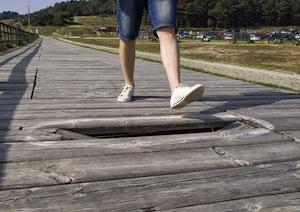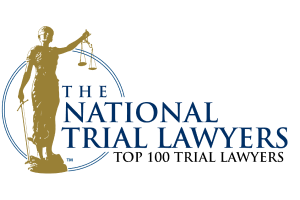Slip and Fall

One of the most common types of premises liability cases are claims arising out of “slip and falls” and “trip and falls.” This occurs when individuals fall on premises owned by another person or company. These cases have an enormous impact on millions of individuals each year. It has been reported that 9,000,000 slip and falls or trip and falls occur each year or approximately 25,000 falls a day. Approximately 95,000,000 work days are lost due to slip and falls and trip and falls. These slips and falls or trip and falls result in approximately $3.5 million in lost revenue per hour. Of course, these statistics do not begin illustrate the significant impact on individuals who have been severely injured due to a slip and fall or trip and fall. These injuries often can alter the injured person’s entire life, and can cause the loss of employment, the loss of mobility, enormous medical bills, as well as permanent pain and suffering and disability.
Liability in slip and fall or trip and fall cases arise from the owner’s failure to maintain the premises and the approaches to the premises in a safe manner. An owner of premises can be held liable when someone slips and falls or trips and falls for a variety of reasons. Some of the reasons a property owner may be held liable for a slip and fall or trip and fall can include:
- the owner’s failure to remove foreign objects on the floor
- the owner’s failure to repair defects on their property
- the owner’s failure to appropriately design their premises or make repairs
- the owner’s failure to warn about a dangerous condition on their property
- the owner’s failure to remove or improperly removing ice, snow or water.
Simply put, if an owner has failed to correct or warn about a dangerous condition on their property, they can be held liable when a person slips and falls or trips and falls on their property and is injured.
Liability in slip and fall cases usually will usually be determined by the specific facts of the case. Important factual considerations are 1) how long the unsafe condition existed and whether the owner had time to discover and fix the problem; 2) whether the steps taken to repair the unsafe condition were appropriate or adequate; and 3) whether the claimant’s carelessness contributed to the accident.
Special laws apply for trespassers or children or accidents at the workplace or on government property. Property owners owe a lesser duty to trespassers. For instance, if a regular customer ventures into a store area that is off-limits, the customer may become a trespasser at that point. Children, on the other hand, also may be trespassers, but the law is more considerate of situations where children venture onto another’s property. If the owner has set up an attraction on the property that may also be dangerous (such as swimming pool), the owner may be liable for not building a fence or a locking gate to keep out children. If the accident happens on the job, then usually worker’s compensations laws of strict liability take over unless the property was owned by someone other than the employer. If the accident occurs on government property, then federal or state laws allowing for tort claims will usually have to be followed. These usually involve strict guidelines for filing claims.
The insurance company for the individual or company which owns the property will start an investigation immediately after a slip and fall or trip and fall occurs. The insurance company’s objective is to try to limit the recovery of the injured person to the lowest possible amount. To that end, insurance companies have established very specific and elaborate procedures on handling slip and fall or trip and fall claims, especially in the early stages of the claim. During this time the insurance company will take recorded statements from the persons involved or witnesses, have the premises examined or tested, have photographs taken, and try to establish the extent of the injuries suffered from the slip and fall or trip and fall. The insurance company is usually able to accomplish all of these items within the first week after the slip and fall or trip and fall and many of them within the first 24 to 48 hours after the person is injured.
Although the approach or tactics of insurance companies vary, many insurance companies try to reach a quick settlement with an injured person. Their purpose is to avoid responsibility for future medical expenses, lost wages and other damages that are likely to develop. This is a trap which an injured person needs to avoid. When a person is injured from a slip and fall or trip and fall, it very often takes months to completely assess the person’s injuries. At that point, the person may need surgery or other extensive treatment. The injuries may leave the person permanently disabled even after corrective surgery. It should be noted that the true value of a claim can only be assessed after a firm prognosis has been established by a physician. The State of Georgia provides in most, but not all, cases a two-year period of time in which to file a lawsuit on a claim. Therefore, there is no need to rush to a settlement with an insurance company. You will only regret the settlement later when your injuries have become progressively worse.
There are other significant issues that develop for persons injured from a slip and fall or trip and fall. For instance, if your health insurance company pays for your medical bills they will very often seek to obtain reimbursement from your settlement with the insurance company of the property owner. There are significant limitations on their right to obtain such reimbursement. Likewise, if you were on the job when injured, the worker’s compensation insurance company will try to obtain reimbursement of their payments for medical expenses and lost wages. Again, there are significant limitations on their right to receive reimbursement. These are important issues that you need to understand prior to agreeing to any settlement with the insurance company.
Determining the appropriate value of a claim for personal injury arising out of a slip and fall is complicated. It involves evaluating the nature and extent of the injury, the economic losses that are recoverable, and the liability issues related to the fall. The location where a trial would take place and any prior injuries suffered by the claimant are issues that are also factored into any evaluation of a personal injury claim. Since insurance companies have vast experience in evaluating personal injury claims and will seek to obtain the lowest settlement possible, it is important to have a person with considerable experience dealing with the insurance company on your behalf. Generally, it is best to retain an Atlanta slip and fall lawyer who regularly handles personal injury claims of this nature and will be prepared to institute litigation on your behalf if the insurance company is unwilling to settle your claim for a fair value.
If you believe that you may have a slip and fall or trip and fall claim, please click here to contact the law firm of Robert N. Katz for a free, private consultation.







